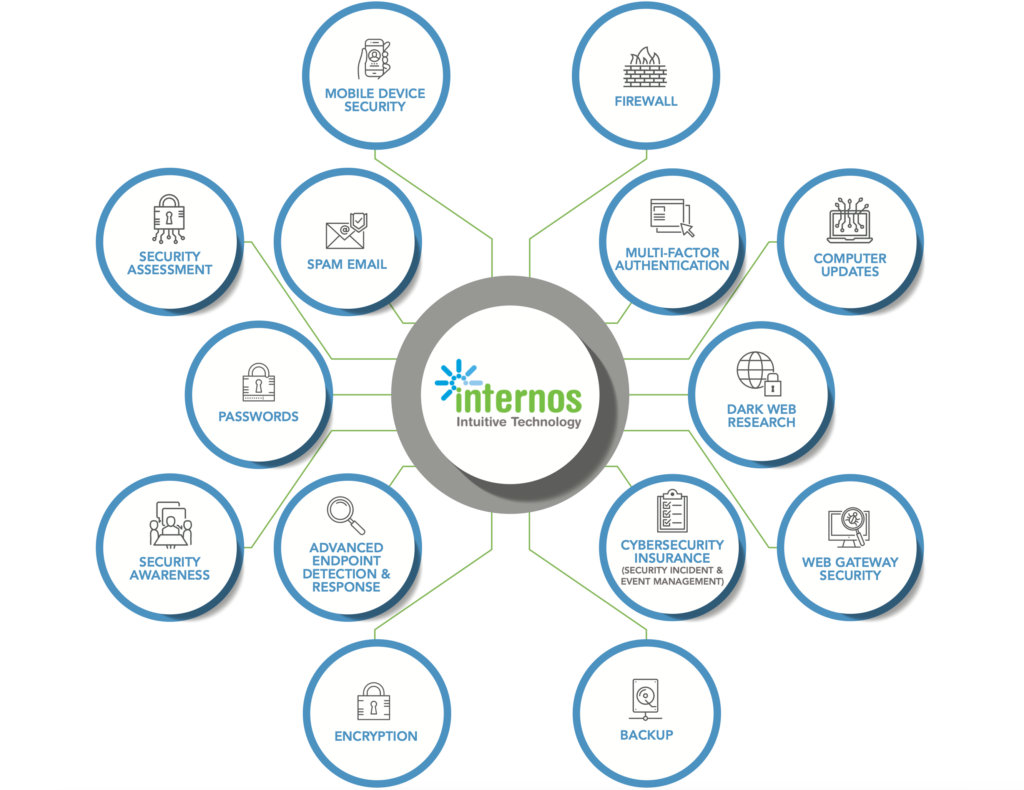
Protecting your company from cyber threats is paramount in today’s world of increasing cybercriminal activity. As an expert managed service provider, we understand the challenges businesses face in safeguarding their sensitive data.

Here are 15 actionable steps to fortify your defenses and ensure the security of your organization.
1. Conduct a Security Assessment
Begin by conducting a thorough cyber security assessment to identify potential vulnerabilities in your systems and networks. Regular assessments will help you stay ahead of emerging threats and implement appropriate countermeasures.
2. Watch for Spam Email
Educate your employees about the dangers of phishing emails and train them to identify suspicious emails. Encourage the use of email filters and consider implementing an email security solution to prevent malicious emails from reaching your employees’ inboxes.
3. Strengthen Passwords
One of the biggest cyber threats to your organization comes from weak passwords. Enforce strong password policies that require complex combinations of letters, numbers and special characters. Encourage employees to use unique passwords for each account and consider implementing a password management system to simplify the process.
Want to learn more about creating strong passwords? Check out our free password management guide.
4. Become Security Aware
Promote a culture of security awareness among your employees. Conduct regular training sessions to educate them about the latest threats, best practices for secure browsing and safe online behavior.
5. Implement Advanced Endpoint Detection and Response
Invest in advanced endpoint detection and response (EDR) solutions to proactively monitor and identify potential threats on your network. EDR tools can help detect and respond to malicious activities before they cause significant damage.
6. Use Multi-Factor Authentication
Implement multi-factor authentication (MFA) across your organization to add an extra layer of security. MFA requires users to provide additional verification, such as a unique code sent to their mobile device, in addition to their password.
7. Make Updates
Regularly update your operating systems and software to ensure that you have the latest security patches. Enable automatic updates whenever possible, and consider implementing a patch management system to streamline the process.
8. Scan the Dark Web
Engage in dark web research to monitor if any of your company’s sensitive data is being sold or shared on underground forums. This proactive approach allows you to take immediate action to mitigate potential breaches.
Not sure how to navigate the dark web? We offer a free dark web scan to help you identify compromised credentials and prevent a data breach.
9. Employ SIEM/Log Management
Implement a security information and event management (SIEM) system to collect and analyze logs from various sources within your network. SIEM helps detect anomalies and provides real-time alerts on potential security incidents and cyber threats.
10. Use Web Gateway Security
Deploy a web gateway security solution to protect against web-based threats, such as malware, ransomware and malicious websites. This solution can block access to harmful content and provide secure web browsing for your employees.
11. Ensure Mobile Device Security
Establish a comprehensive mobile device security policy that includes device encryption, remote wipe capabilities and regular security updates. Encourage employees to use secure VPNs when accessing company resources from their mobile devices.
12. Install Firewalls
Deploy a robust firewall solution to monitor and control incoming and outgoing network traffic. Regularly review firewall rules and policies to ensure they align with your organization’s security requirements.
13. Encrypt Data
Implement encryption protocols to protect sensitive data, both at rest and during transmission. Utilize encryption technologies such as SSL/TLS for secure communication and full-disk encryption to safeguard data stored on devices.
14. Back Up Data
Implement a regular backup strategy that includes both on-site and off-site backups. Regularly test your backups to ensure data integrity and consider using cloud-based backup solutions for added security.
And, if you’re debating between endpoint backup vs shared vs local backup, we’ve written a guide on the subject.
15. Obtain Cyber Insurance
Consider investing in cyber insurance to mitigate financial losses in the event of a cyber incident. Cyber insurance provides coverage for expenses related to data breaches, business interruption and legal liabilities.
Fighting Cyber Threats: Next Steps
Protecting your company from cybercriminal behavior requires a multi-layered approach that encompasses technology, education and proactive measures. By implementing these 15 strategies, you can fortify your defenses and ensure the security of your valuable data.
Remember, digital threats are constantly evolving, so it’s crucial to stay vigilant and adapt your security measures accordingly.
At Internos, we are committed to helping businesses navigate the complex world of cyber security. Contact us or book a meeting today to learn more about our managed services and how we can assist you in safeguarding your organization against cybercrime.

